Coffee Basics
The Impact of Water Quality on Coffee Taste and Health Benefits
Perfecting your coffee experience starts with water quality; discover how it transforms taste and health benefits in ways you never imagined.

Water quality directly impacts the flavor and health benefits of your coffee. Using filtered water removes contaminants, brightening flavors and enhancing aroma. Ideal water should have a neutral pH of around 7.0 and appropriate mineral content to avoid flat or overly bitter tastes. Soft water creates smoother profiles, while harder water can clarify flavors but may mask nuances. Additionally, access to clean water decreases harmful substances like microplastics and heavy metals, contributing to improved health. By focusing on quality water in your brewing, you'll discover how much it elevates your coffee experience. There's more to uncover about this connection!
Key Takeaways
- Filtered water enhances coffee flavor by removing impurities like chlorine and heavy metals, leading to a brighter taste and aroma.
- The ideal pH range for brewing coffee (6.5-7.5) significantly impacts flavor, with neutral pH promoting balanced extraction.
- Calcium and magnesium in water enhance flavor profiles, while TDS levels between 50-150 ppm support optimal coffee extraction.
- Using filtered water reduces harmful contaminants, promoting safer consumption and better overall health.
- Microplastics in tap water can negatively affect coffee taste; effective purification systems help eliminate these contaminants for improved quality.
Importance of Water Quality
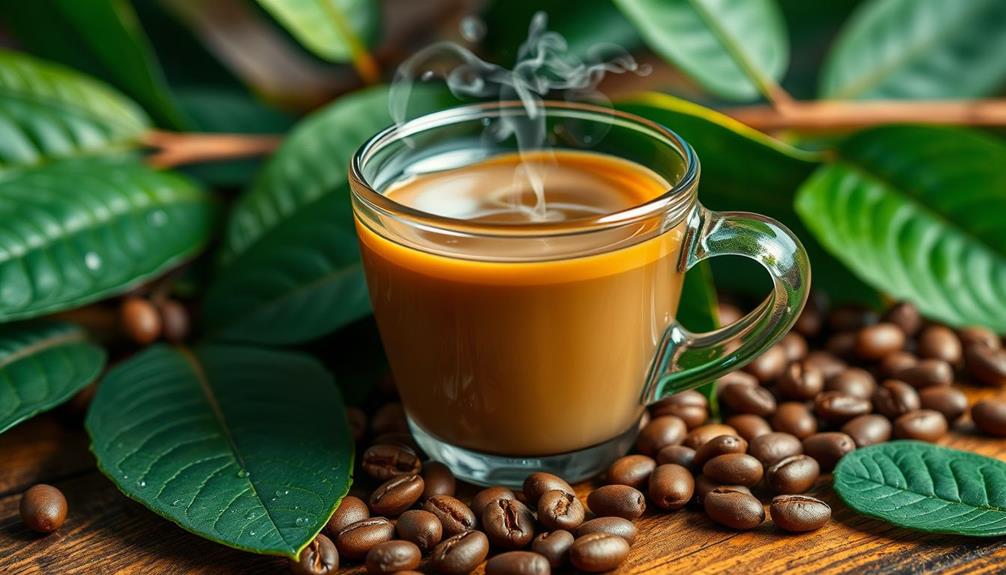
Water quality is essential for brewing an exceptional cup of coffee. The brewing process relies heavily on the water you use, as impurities like chlorine, lead, and excess minerals can compromise flavor profiles.
You want to aim for filtered water, which greatly enhances the flavor quality by removing these contaminants. This leads to a brighter color and a more intense aroma in your coffee. Understanding the impact of brewing methods can further help you appreciate how water quality interacts with different coffee styles.
For the best results, keep an eye on the pH levels of your water. The ideal pH range for brewing coffee is between 6.5 and 7.5. If the pH is too high, the taste can become bland; too low, and your brew might turn overly acidic.
Soft water is generally preferable for coffee brewing, producing a rounder, softer flavor. While hard water can enhance flavor clarity, it may mask those subtle nuances that make your coffee unique.
Regularly testing your tap water quality and investing in a good water filtration system can dramatically improve your brewing experience. You'll notice the difference in taste, turning an ordinary cup into an extraordinary one.
Water Types for Brewing

Choosing the right type of water for brewing can make all the difference in your coffee's flavor. Water quality affects not just the taste but also the overall coffee experience.
Tap water often contains impurities like chlorine and heavy metals that can detract from your brew, making it less desirable. Instead, consider using filtered water, which removes solids and bacteria, enhancing both flavor and aroma.
Additionally, using water with the right mineral content can enhance the extraction process, leading to a more balanced cup of coffee, similar to the impact of coffee varieties on taste profiles.
Bottled water is another great option. Spring water offers natural minerals that can elevate your coffee's taste, while purified water provides a clean base for brewing.
However, avoid distilled water; its lack of minerals can lead to a flat taste, which isn't ideal for brewing methods that rely on a balance of mineral content.
Regular water quality testing is vital. Understanding the pH level and mineral content helps you choose the best water type for your brewing needs.
Impact of Water Ph
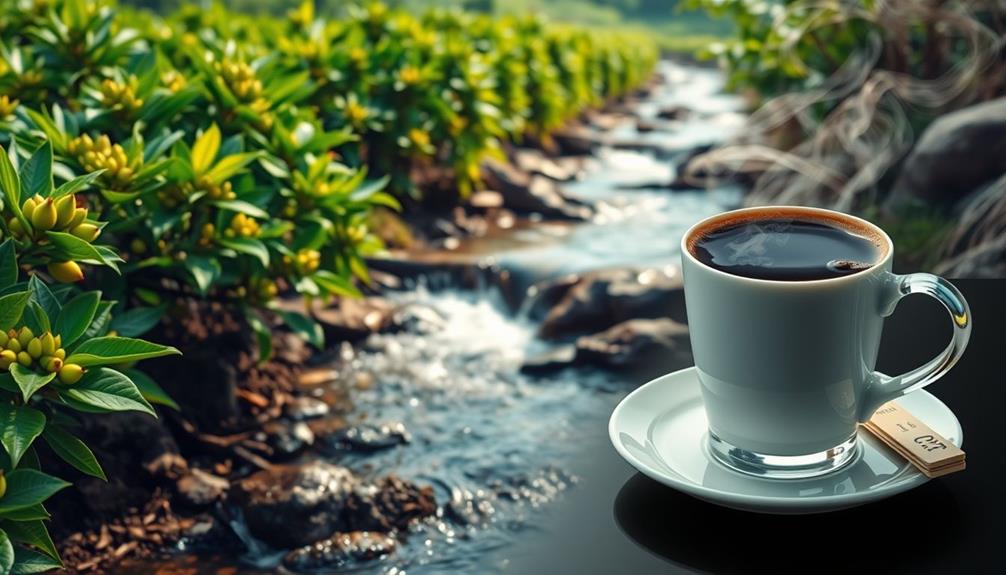
The pH level of your brewing water plays a vital role in shaping your coffee's flavor profile. Ideally, you want your brewing water pH to be around 7.0, which is neutral. This balance enhances the acidity level necessary for a vibrant and complex flavor of coffee.
When the water pH rises above 6, it can diminish that acidity and sourness, resulting in a flatter taste. Excessively alkaline water can dramatically alter the original taste of your coffee, leading to a loss of its intended flavor characteristics.
Additionally, air quality considerations can influence the overall environment in which you brew, potentially affecting your sensory experience. Furthermore, if your brewing water contains high sodium ion content, it may introduce an unwanted salty taste, further impacting the overall flavor of your brewed coffee.
To achieve ideal coffee extraction, maintaining a balanced pH in your brewing water is essential. The impact of water quality, including its pH level, can't be overlooked if you're looking to brew the perfect cup.
Effects of Water Hardness

Water hardness can make a big difference in your coffee experience. When you use soft water, you get a smoother, more balanced flavor, while hard water can lead to unpleasant metallic or sour notes.
Additionally, the mineral content in your water can affect not only the taste but also the extraction of flavors from the coffee grounds, impacting your overall brew quality.
To brew the best cup, you should keep an eye on your water's mineral content, particularly the impact of cold medications that might affect your taste perception.
Soft Water Benefits
Soft water can greatly enhance your coffee experience by creating a rounder, softer flavor profile. With its low levels of calcium and magnesium, soft water allows for improved extraction efficiency, which is vital for achieving a balanced cup of coffee.
When you brew with soft water, you're likely to notice a reduction in bitterness, making your coffee more enjoyable, especially if you're sensitive to strong flavors. Additionally, understanding the impact of common financial terms can help you make informed decisions regarding investments in coffee equipment, leading to a better brewing experience.
To reach the best flavor expression, it's important to find the right balance of mineral ions. Ideally, the hardness level for brewing coffee should fall between 70-80 mg/L.
This range provides enough minerals to highlight the distinctive characteristics of your coffee without overshadowing its nuanced flavors. Using excessively soft water can sometimes mask these subtleties, so moderation is key.
Hard Water Drawbacks
When brewing coffee, using hard water can greatly hinder your experience. The high levels of calcium and magnesium in hard water often lead to a metallic or sour taste in your coffee, negatively impacting the overall flavor profile.
These minerals can also diminish flavor clarity, masking the subtle nuances that make your brew enjoyable. Instead of tasting the intricate flavors of your favorite coffee, you might find it less appealing due to this interference.
Additionally, just as essential oils like eucalyptus oil can aid in relieving sinus congestion, using softer water can help enhance the clarity and brightness of your coffee flavor.
Moreover, hard water can enhance bitterness, restricting the natural acidity that contributes to a balanced flavor, especially in specialty brews. You might notice that your coffee tastes flat or overly harsh, which detracts from the entire experience.
Additionally, the minerals in hard water often cause scale buildup in coffee machines, which can impact their efficiency and lead to more frequent maintenance.
For ideal coffee brewing, the perfect hardness level is between 70-80 mg/L. This range strikes a balance that enhances flavor without introducing undesirable tastes.
If you want to enjoy your coffee to its fullest, consider using softer water to achieve a better taste and overall experience.
Role of Minerals in Water
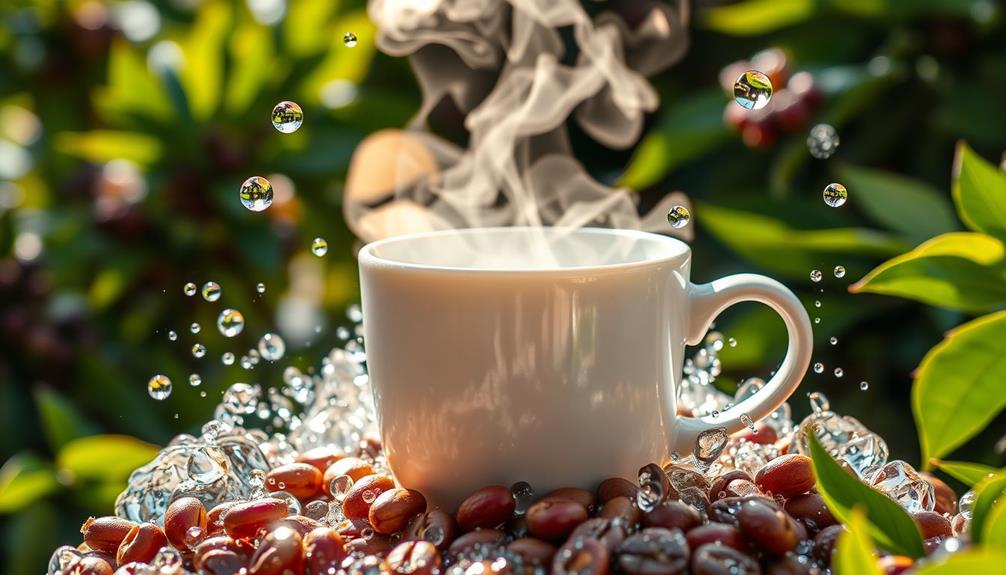
Understanding the role of minerals in brewing coffee can greatly elevate your experience. Minerals like calcium and magnesium are essential for enhancing your coffee's flavor profile. The right balance of these minerals can improve extraction efficiency and overall taste.
| Mineral Type | Recommended Level (mg/L) | Flavor Impact |
|---|---|---|
| Calcium | 30-70 | Enhances body and sweetness |
| Magnesium | 10-30 | Adds complexity and smoothness |
| Total Dissolved Solids (TDS) | 50-150 | Balances flavor clarity and richness |
| Soft Water | Low levels | Produces a rounder, softer taste |
| Hard Water | High levels | Enhances flavor clarity |
The ideal TDS range for brewing coffee is between 50-150 ppm. Water that's too soft may mask nuanced flavors, while excessive calcium can diminish the coffee's taste. Striking a balance between softness and mineral content is vital for achieving the best brewing results. By carefully considering the minerals in your water, you can greatly enhance your coffee experience.
Health Benefits of Filtered Water

Filtered water offers numerous health benefits that can enhance your coffee experience. By considerably reducing harmful contaminants like lead and chlorine, you're ensuring a healthier beverage that's safer to consume. Additionally, using filtered water can help you avoid excessive sugar and fat found in certain beverages, promoting a more balanced diet overall, especially when considering alternatives like ice cream health considerations.
This reduction of impurities not only promotes better health but also elevates your coffee's flavor profile. When you brew with filtered water, you'll notice a brighter, more balanced taste, allowing the natural flavors of your coffee beans to shine through without interference from off-flavors or bitterness.
Regularly drinking filtered water supports your overall hydration needs, providing a cleaner beverage compared to untreated tap water. This is particularly important as microplastics have become increasingly prevalent in tap water, posing potential health risks. By choosing filtered water, you minimize your exposure to these contaminants, making a positive choice for your health.
Ultimately, using filtered water enriches your coffee experience while promoting better hydration and well-being. You'll enjoy not just the taste of your coffee, but also the peace of mind that comes from knowing you're consuming a cleaner, healthier beverage.
Make the switch to filtered water, and watch how it transforms your daily coffee ritual.
Grinding Coffee for Flavor

When you grind coffee beans just before brewing, you lock in the freshness and aroma that make each cup special.
Choosing the right grind size can also enhance the brewing process, much like how certain yoga techniques can improve overall well-being.
The grind size plays an essential role too—coarse for French press and fine for espresso—to maximize flavor extraction.
Getting this right can transform your coffee experience, allowing the unique characteristics of the beans to shine.
Grind Size Importance
The grind size of your coffee beans plays an essential role in how flavors are extracted during brewing. The right grind size can enhance your coffee experience, while the wrong one can lead to disappointing results.
Studies suggest that even the type of equipment used can influence the extraction process, much like how different zodiac signs are associated with varying levels of charm.
Here's what you need to keep in mind:
- Finer grinds increase surface area, enhancing flavor extraction.
- Coarse grind works best for methods like French press, allowing for peak extraction over longer steeping times.
- A grind size that's too coarse can cause under-extraction, resulting in sour flavors.
- Conversely, a grind that's too fine may lead to over-extraction, creating bitterness.
- Different brewing methods require different grind sizes; for instance, medium grind for drip coffee and very fine grind for Turkish coffee.
Understanding the ideal grind size for your brewing method is vital. By adjusting your grind size, you can reveal the full potential of your coffee beans, delivering rich, balanced flavors in every cup.
Freshness and Aroma
Freshly ground coffee beans are vital for revealing the full spectrum of aroma and flavor in your brew. Grinding just before brewing preserves the essential oils and volatile compounds that contribute to a vibrant coffee experience. Did you know that ground coffee can lose up to 60% of its aroma within just 15 minutes? Keeping that in mind, selecting the right grind size based on your brewing method is fundamental.
| Grind Size | Brewing Method | Aroma Impact |
|---|---|---|
| Coarse | French Press | Rich, bold aroma |
| Medium | Drip Coffee | Balanced flavor |
| Fine | Espresso | Intense, concentrated aroma |
Using purified water, like from the Bluewater Café Station™, guarantees that unwanted impurities don't interfere with flavor extraction. The right water quality, combined with ideal grind size and freshness, enhances the overall brew, resulting in a richer taste and more pronounced aroma. So, to elevate your coffee experience, prioritize grinding your beans fresh and using the best water available.
Choosing Quality Coffee Beans

Choosing quality coffee beans is essential for crafting a delicious cup that truly satisfies your palate. The origin of the beans affects their flavor, with regions like Ethiopia offering fruity and floral notes, while Colombian beans provide a balanced, nutty taste.
Akin to selecting the right songs to fit your voice, finding the perfect coffee bean requires consideration of various factors that can enhance your experience, including thematic coherence.
When picking your coffee, consider the following:
- Freshness: High-quality, freshly roasted beans enhance aroma and flavor.
- Roast Level: Light roasts have higher acidity and vibrant tastes, while dark roasts are bolder and richer.
- Origin: Different regions impart unique flavors that can elevate your brewed coffee experience.
- Purity of Water: Brewing with clean, purified water, like that from Bluewater Café Station™, allows the coffee's true flavors to shine by eliminating minerals that could distort the taste.
- Personal Preference: Explore diverse beans to find the perfect match for your brewing method and taste buds.
Microplastics and Coffee Safety

When brewing your perfect cup of coffee, the purity of the water you use plays a considerable role. Microplastics, which are commonly found in tap water, can negatively affect the taste of your coffee and introduce harmful contaminants into your beverage.
Research indicates that these microplastics are prevalent in various water sources, potentially altering the flavor profile of brewed coffee. To confirm you're enjoying the best possible experience, using clean water is essential.
Microplastics can interfere with the extraction process, compromising the overall coffee flavor. That's where effective water purification systems come in. For instance, the Bluewater Café Station™ purification system effectively eliminates microplastics, confirming that every cup you brew is free from these contaminants.
Regular testing and purification of your brewing water can notably enhance coffee quality while protecting your health from microplastic exposure. By prioritizing water quality, you not only improve the taste of your coffee but also reap its health benefits.
Tips for Optimal Brewing
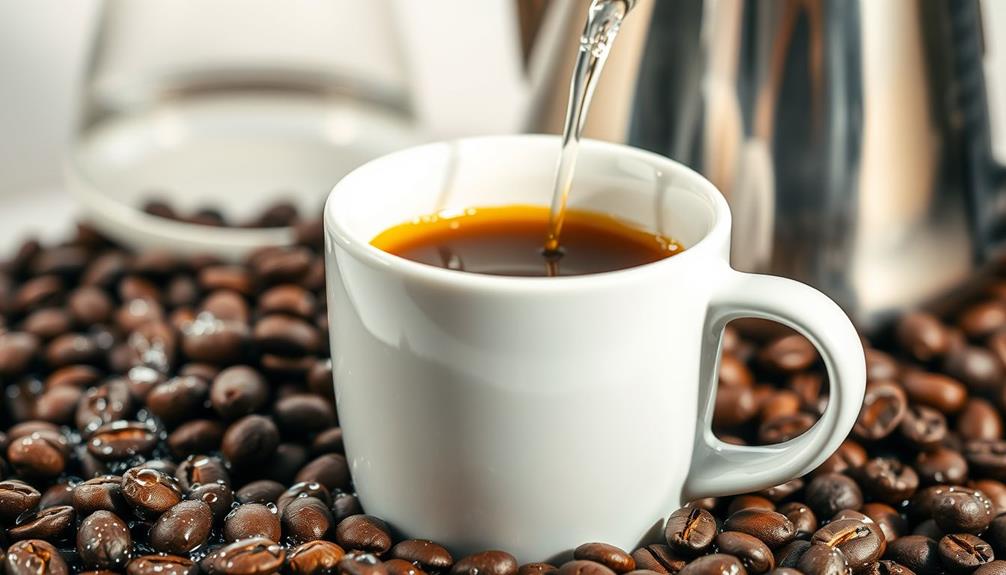
To brew the best coffee, prioritize water quality.
Use filtered water with a TDS range of 120-130 ppm and adjust the pH to around 7.0 for ideal flavor extraction.
Don't hesitate to experiment with different brewing methods and temperatures to find what suits your taste.
Water Quality Prioritization
Prioritizing water quality is essential for brewing the perfect cup of coffee. Using filtered water not only removes impurities like chlorine and heavy metals but also enhances the overall flavor.
Here are some tips to guarantee ideal brewing:
- Maintain a Total Dissolved Solids (TDS) range of 120-130 ppm for balanced flavor and extraction.
- Regularly test your water quality to meet ideal standards, aiming for a neutral pH of 7.0 and a hardness level of 70-80 mg/L.
- Invest in reliable water filtration systems, such as reverse osmosis or carbon fiber filters, to preserve beneficial minerals while guaranteeing consistent water quality.
- Understand how different water compositions affect taste, allowing you to customize your brews to your personal preferences.
- Experiment with various filtration methods to discover the unique flavors that each can bring out in your coffee.
Brewing Method Experimentation
Experimenting with different brewing methods is vital for revealing the full potential of your coffee. Techniques like French press, pour-over, and espresso each impact your coffee's flavor profile in unique ways.
To get the best results, maintain ideal brewing temperatures between 195°F to 205°F. This range enhances flavor extraction while avoiding bitterness.
Using the right water for brewing is just as important. Regularly test your tap water's quality, aiming for a Total Dissolved Solids (TDS) level of 120-130 ppm and a pH around 7.0. This guarantees your coffee taste remains pure and vibrant.
Stick to a consistent brew ratio, generally around 1:15 (coffee to water), to control strength and achieve a balanced cup.
Also, don't forget to grind your coffee beans fresh right before brewing. Adjust the grind size based on your chosen brewing method—coarse for French press and fine for espresso.
Frequently Asked Questions
Does Water Quality Affect Coffee Taste?
Yes, water quality affects coffee taste. If you use clean, filtered water, you'll notice a richer flavor. Impurities can lead to undesirable tastes, so choosing the right water can truly enhance your brewing experience.
Does Tap Water Affect the Taste of Coffee?
Did you know that over 60% of coffee's flavor comes from water? So yes, tap water can definitely affect your coffee's taste. Using filtered water helps you avoid unpleasant flavors, ensuring a more enjoyable cup every time.
Does Water Change the Taste of Coffee?
Yes, water changes the taste of coffee. If you use filtered water, it enhances the flavors, while hard or contaminated water can dull them. Experimenting with different water types can transform your coffee experience considerably.
Does Coffee Taste Better With Filtered Water?
Using filtered water can enhance your coffee's flavor markedly; studies show it improves taste by up to 30%. You'll notice a smoother, more balanced cup, making your morning ritual even more enjoyable. Give it a try!
Conclusion
In the symphony of coffee brewing, water quality plays the conductor, guiding every note of flavor and health. When you choose the right water, you unveil a treasure trove of taste and benefits, transforming each sip into a delightful experience. Remember, it's not just about the beans; it's the harmonious dance of minerals and purity that elevates your brew. So, embrace the art of brewing with care, and let your cup sing with the essence of quality.
In the vast and diverse world of coffee, coffee alternatives, and tea, Olivia has found her calling. As an author and a dedicated coffee and tea aficionado, her work for Cappuccino Oracle reflects her profound love and understanding of the intricate complexities found within these beverages. Olivia’s passion for the subject serves as both a catalyst for her creativity and a connection point with her audience.
Olivia’s appreciation for coffee, coffee alternatives, and tea blossomed at an early age. She discovered that these beverages invigorated her senses and stimulated her creative spirit. From the nuanced flavors of single-origin roasts to the captivating narratives intertwined with coffee, coffee alternatives, and tea trade and culture, Olivia found an unlimited source of inspiration in her daily cup.
Her love for these beverages and her talent for storytelling eventually converged at Cappuccino Oracle. As an author, Olivia’s mission is to illuminate the intricate tapestry that makes up the world of coffee, coffee alternatives, and tea. Her articles span a diverse range of topics, encompassing everything from the unique flavors of different brews to the sociocultural history intertwined with their cultivation and consumption.
Coffee Basics
How Much Is a Small Hot Coffee at Dunkin Donuts

At Dunkin Donuts, we understand the impact a great cup of coffee can have on brightening your day.
So, how much does a small hot coffee cost? Well, we’ve got the inside scoop for you.
In this article, we’ll break down the prices of various small hot coffee options at Dunkin Donuts. From regular to flavored, and even specialty coffees, we’ll help you find the perfect cup to start your day off right.
Let’s dive in and discover the affordable and delicious options waiting for you at Dunkin Donuts.

Key Takeaways
- Regular small hot coffee at Dunkin Donuts costs around $2.
- Dunkin Donuts offers a variety of flavored small hot coffees, including French Vanilla, Cinnamon, Hazelnut, Blueberry, and Caramel.
- Dunkin Donuts offers a range of specialty small hot coffees with flavors like caramel swirl, French vanilla, hazelnut, and mocha.
- Dunkin Donuts provides milk alternatives such as almond milk, oat milk, and coconut milk for those looking for a dairy-free option.
Regular Small Hot Coffee
We usually pay around $2 for a regular small hot coffee at Dunkin Donuts. When it comes to cost comparison, Dunkin Donuts is often seen as more affordable than other coffee chains. For those on a budget, this is great news.
In terms of caffeine content, a regular small hot coffee at Dunkin Donuts typically contains around 215 milligrams of caffeine. This amount can provide a good boost of energy for those who need it. However, it’s important to note that caffeine content can vary depending on the type of coffee beans used and the brewing method.
Flavored Small Hot Coffee
Moving on to the topic of flavored small hot coffee at Dunkin Donuts, our go-to choice for a caffeine boost and an indulgent treat. Dunkin Donuts offers a variety of flavored coffee alternatives to satisfy different taste preferences. These flavored coffees are created by infusing the beans with natural extracts and oils, providing a delightful twist to your regular cup of joe. The benefits of flavored coffee are twofold – they add an extra layer of flavor and aroma to your coffee, enhancing the overall experience, and they can help mask any bitter or unpleasant taste that may be present in the beans. Whether you prefer the rich sweetness of French Vanilla, the warm spice of Cinnamon, or the creamy indulgence of Hazelnut, Dunkin Donuts has a flavored small hot coffee to suit your desires.
| Flavored Small Hot Coffee | ||
|---|---|---|
| French Vanilla | Cinnamon | Hazelnut |
| Blueberry | Caramel |
Indulge yourself with these delicious flavor options and elevate your coffee experience at Dunkin Donuts.
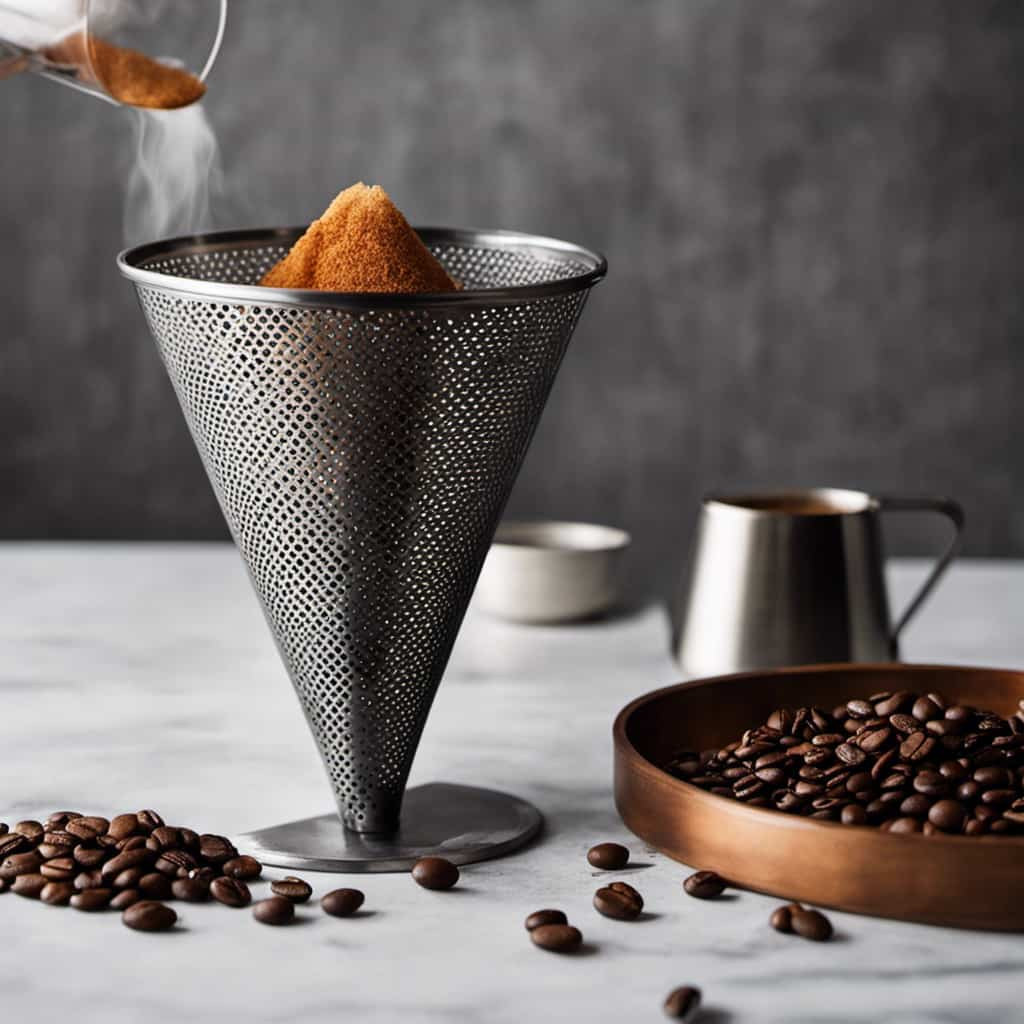
Specialty Small Hot Coffee
For our caffeine connoisseurs seeking a unique and flavorful experience, Dunkin Donuts offers a range of specialty small hot coffees. These specialty coffees are crafted with care and attention to detail, providing a delightful and satisfying drinking experience.
One of the benefits of drinking small hot specialty coffee is the opportunity to try a variety of flavors that aren’t typically found in regular coffee. Dunkin Donuts offers a selection of popular flavors such as caramel swirl, French vanilla, hazelnut, and mocha. These flavors add a touch of sweetness and richness to the coffee, enhancing the overall taste.
Whether you prefer a classic flavor or something more adventurous, our specialty small hot coffees are sure to please your taste buds.
Small Hot Coffee With Milk Alternatives
Milk alternatives can be added to small hot coffee at Dunkin Donuts for those looking for a dairy-free option. Dunkin Donuts offers a variety of milk alternatives that customers can choose from to customize their small hot coffee. These milk alternatives provide a range of benefits for those who prefer to avoid dairy products in their coffee. Here is a table showcasing some of the milk alternatives available at Dunkin Donuts:

| Milk Alternatives | Benefits |
|---|---|
| Almond Milk | Dairy-free, low in calories and fat |
| Oat Milk | Creamy texture, nutty flavor |
| Coconut Milk | Rich and creamy, adds a tropical twist |
Adding milk alternatives to small hot coffee not only caters to customers with dietary restrictions, but it also allows them to enjoy the flavor and texture they desire. Now, let’s move on to the next section about small hot coffee with add-ons.
Small Hot Coffee With Add-Ons
Continuing our exploration of customizing small hot coffee at Dunkin Donuts, here are four options to consider that can enhance the flavor and experience:
- Flavor Shots: Add a burst of flavor to your coffee with options like vanilla, caramel, hazelnut, or mocha. These shots are a great way to personalize your beverage and satisfy your taste buds.
- Sweeteners: Customize the level of sweetness by adding sugar, artificial sweeteners, or natural alternatives like honey or stevia. This allows you to control the amount of sweetness to suit your preferences.
- Creamers: Dunkin Donuts offers a variety of creamers, including regular milk, almond milk, oat milk, or soy milk. These options cater to different dietary needs and add a creamy texture to your coffee.
- Spices: Enhance the flavor profile of your coffee by adding spices like cinnamon, nutmeg, or cardamom. These spices can add warmth and depth to your beverage.
Frequently Asked Questions
Are There Any Seasonal Flavors Available for the Flavored Small Hot Coffee at Dunkin Donuts?
Yes, there are seasonal flavors available for the flavored small hot coffee at Dunkin Donuts. Additionally, there are sugar alternatives available for those who prefer a different sweetener option.
Can I Customize the Sweetness Level of the Specialty Small Hot Coffee?
At Dunkin Donuts, you can personalize your specialty small hot coffee by choosing the sweetness level. Additionally, they offer decaf options for those who prefer less caffeine.

Are There Any Non-Dairy Milk Alternatives Available for the Small Hot Coffee at Dunkin Donuts?
Yes, there are non-dairy milk alternatives available for the small hot coffee at Dunkin Donuts. We understand that everyone has different coffee preferences and strive to accommodate them.
Can I Add Whipped Cream to My Small Hot Coffee?
Yes, whipped cream is available as a customization option for our small hot coffee at Dunkin Donuts. It’s a delightful addition that can enhance the flavor of your coffee. Enjoy!
Is There a Limit on the Number of Add-Ons I Can Have in My Small Hot Coffee at Dunkin Donuts?
There are limitations on the number of add-ons for a small hot coffee at Dunkin Donuts. However, they offer alternatives for non-dairy milk, ensuring that everyone’s preferences are accommodated.
Conclusion
In conclusion, the price of a small hot coffee at Dunkin’ Donuts varies depending on the type of coffee you choose. A regular small hot coffee is priced at around $1.99, while a flavored small hot coffee costs approximately $2.49. For those looking for a specialty small hot coffee, the price is around $2.99.
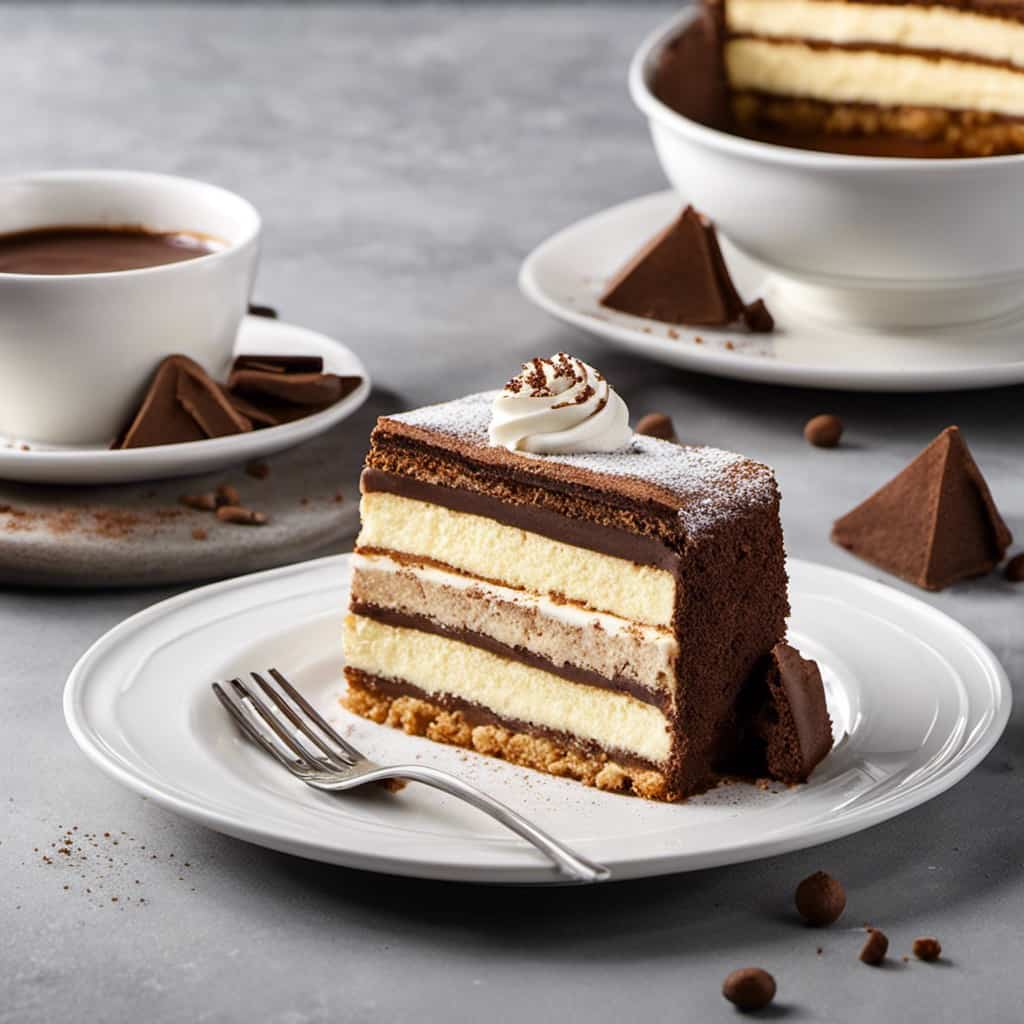
It’s interesting to note that Dunkin’ Donuts offers a variety of milk alternatives, such as almond milk and oat milk, for an additional charge of $0.50.
Justin is a seasoned author, coffee and tea enthusiast, and an essential member of the Cappuccino Oracle team. With a keen appreciation for the complexities of coffee, coffee alternatives, and tea, Justin has dedicated his professional career to exploring these realms and sharing his insights with readers worldwide.
Justin’s immersion in the world of coffee, coffee alternatives, and tea began at a young age, kindling a passion that extended beyond mere consumption. This love for these beverages led him to combine his talent for writing with his devotion to coffee and tea, bringing him to Cappuccino Oracle as a dedicated author.
Coffee Basics
How Much Is a Iced Coffee at Mcdonald’s

Do you have a hankering for a chilly iced coffee from McDonald’s? Don’t worry, we’ve got you covered! In this article, we’ll delve into the realm of McDonald’s iced coffees, examining their prices, sizes, flavors, and more.
So, whether you’re a fan of the classic regular iced coffee or prefer something a little more indulgent with flavored options, we’ll provide you with all the information you need to satisfy your caffeine cravings.
Let’s embark on this delightful journey together!
Key Takeaways
- The price of regular iced coffee at McDonald’s starts at $1.39 and may vary based on location and promotions.
- Flavored iced coffee at McDonald’s comes in small, medium, and large sizes, with prices starting at $2.49.
- McDonald’s offers a variety of flavors for their iced coffee, including vanilla, caramel, hazelnut, and mocha.
- Customers can customize their iced coffee with add-ons like flavored syrups, whipped cream, and extra espresso shots, but extra charges may apply.
Regular Iced Coffee Prices
Our regular iced coffee’s price at McDonald’s is determined by the size and any additional customization. The standard size for our regular iced coffee is 16 ounces, and it starts at $1.39. However, the price may vary depending on the location and any special promotions or discounts available.

At McDonald’s, we offer a variety of flavors for our iced coffee, including classic vanilla and caramel. As for the brewing methods, we use a combination of freshly brewed coffee and ice to create a refreshing and flavorful beverage.
Our goal is to serve our customers with a delicious and affordable iced coffee experience, ensuring that they have options to customize their drink according to their preferences.
Flavored Iced Coffee Prices
To determine the prices of flavored iced coffee at McDonald’s, we take into account the size and any additional customization options. McDonald’s offers a variety of flavored iced coffee options to suit different tastes. Some of the popular iced coffee flavors include caramel, vanilla, hazelnut, and mocha. Each flavor adds a unique twist to the classic iced coffee, providing customers with a refreshing and flavorful experience.
The prices for flavored iced coffee start at around $2.49 for a small size, $2.89 for a medium size, and $3.39 for a large size. These prices may vary depending on the location and any additional customization options, such as adding whipped cream or extra syrup.
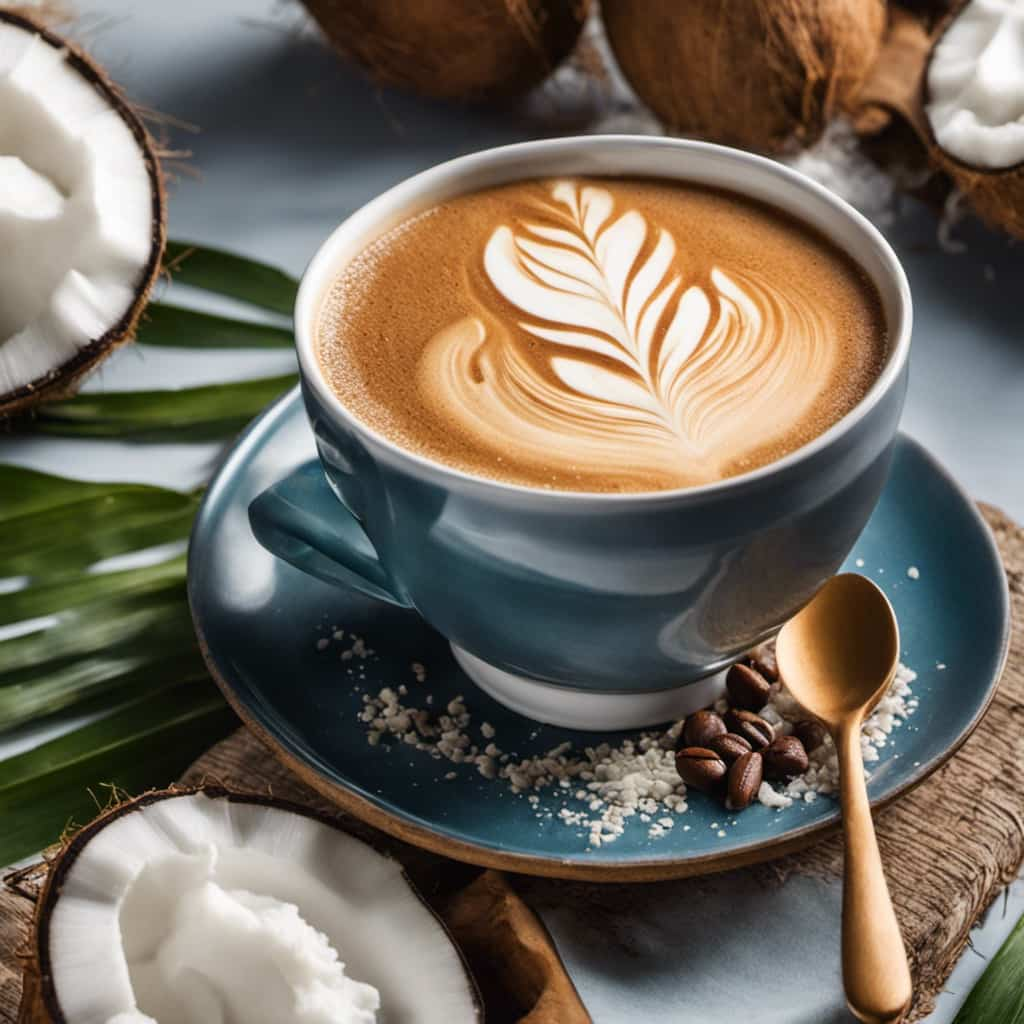
Now, let’s move on to discuss the different sizes and prices of McDonald’s iced coffee.
Iced Coffee Sizes and Prices
The prices and sizes of McDonald’s iced coffee offerings vary depending on the location and any additional customization options. McDonald’s offers a range of sizes for their iced coffee, including small (12 oz), medium (16 oz), and large (22 oz). Each size comes with its own price point, which also varies by location.
As for flavors, McDonald’s typically offers classic iced coffee options such as regular, vanilla, caramel, and mocha. The calories in McDonald’s iced coffee vary based on the size and any additional flavorings or toppings. It’s important to note that these numbers can also vary depending on the specific ingredients used at different locations.
Now that we’ve covered the sizes and prices of McDonald’s iced coffee, let’s move on to discuss the available add-ons and any extra charges that may apply.

Iced Coffee Add-Ons and Extra Charges
For iced coffee at McDonald’s, there are various add-ons and extra charges available. If you’re looking to customize your iced coffee, you can choose from a range of options such as flavored syrups, whipped cream, and additional espresso shots. However, it’s important to note that these add-ons may come with extra charges.
The prices for customization vary depending on the specific add-on and the location of the McDonald’s restaurant. Some popular iced coffee flavors include vanilla, caramel, and mocha. These flavors can add a delicious twist to your iced coffee experience.
Keep in mind that the prices for add-ons and extra charges are subject to change, so it’s always a good idea to check with your local McDonald’s for the most accurate information.
Now let’s move on to the next section and explore the exciting world of iced coffee discounts and promotions.

Iced Coffee Discounts and Promotions
Now let’s explore the exciting world of iced coffee discounts and promotions at McDonald’s.
McDonald’s frequently offers specials and promotions on their iced coffee, allowing customers to enjoy their favorite flavors at a discounted price. These promotions can vary by location and time of year, so it’s always a good idea to check with your local McDonald’s for current offers.
Some popular flavors of iced coffee at McDonald’s include caramel, vanilla, hazelnut, and mocha. These flavors can be enjoyed with or without cream and sugar, allowing for a customized experience.
Whether it’s a buy one get one free promotion or a discounted price for a limited time, McDonald’s offers a variety of ways to enjoy their delicious iced coffee at a great value.
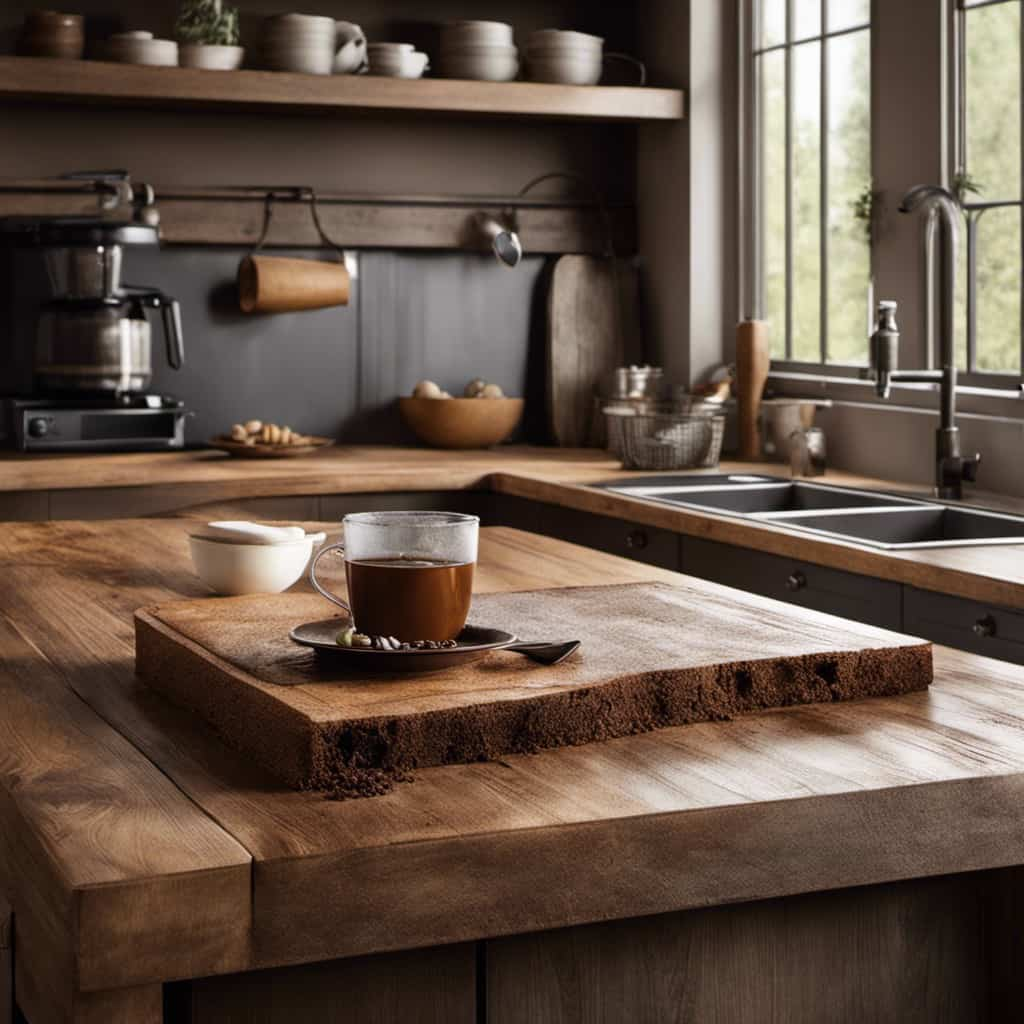
Frequently Asked Questions
What Are the Nutritional Facts for Mcdonald’s Regular Iced Coffee?
When it comes to McDonald’s regular iced coffee, there are customization options available to suit your preferences. Additionally, it’s worth noting the nutritional benefits of this refreshing beverage.
Can I Customize the Sweetness Level of My Flavored Iced Coffee at Mcdonald’s?
Yes, you can customize the sweetness level of your flavored iced coffee at McDonald’s. They offer a range of customization options, allowing you to adjust the sweetness to your liking. Additionally, they also have decaf iced coffee available.
Are There Any Seasonal or Limited-Time Flavors Available for Mcdonald’s Iced Coffee?
Seasonal flavor options and special promotions for our iced coffee are available at McDonald’s. We offer a variety of limited-time flavors to satisfy your taste buds and keep things exciting.
Does Mcdonald’s Offer Any Non-Dairy Milk Options for Their Iced Coffee?
At McDonald’s, we offer non-dairy milk options for our iced coffee, making it vegan-friendly. Customers can choose from alternatives like almond milk or oat milk to enjoy their refreshing iced coffee.
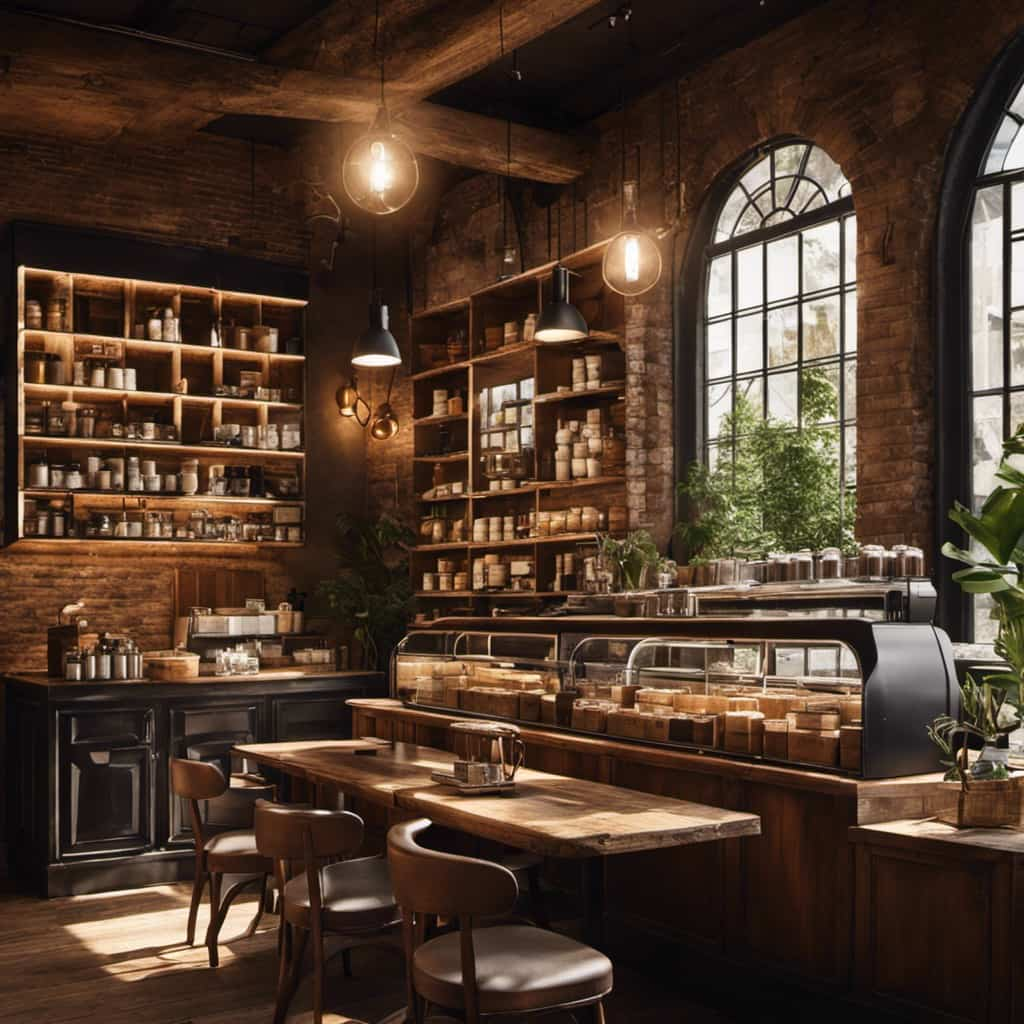
Are There Any Secret Menu Items or Hacks for Getting a Cheaper Iced Coffee at Mcdonald’s?
The best ways to save money at McDonald’s include ordering customized drinks. Tips for ordering at fast food restaurants can help you get cheaper iced coffee. Try secret menu items or hacks for discounts.
Conclusion
In conclusion, McDonald’s offers a variety of iced coffee options at reasonable prices. The regular iced coffee starts at just $1.99, while the flavored ones are slightly higher at $2.49. Customers can choose from different sizes, ranging from small to large, with corresponding prices.
Additionally, there are various add-ons available for an extra charge. It’s worth checking for any discounts or promotions to make the most out of your iced coffee experience at McDonald’s.
Justin is a seasoned author, coffee and tea enthusiast, and an essential member of the Cappuccino Oracle team. With a keen appreciation for the complexities of coffee, coffee alternatives, and tea, Justin has dedicated his professional career to exploring these realms and sharing his insights with readers worldwide.
Justin’s immersion in the world of coffee, coffee alternatives, and tea began at a young age, kindling a passion that extended beyond mere consumption. This love for these beverages led him to combine his talent for writing with his devotion to coffee and tea, bringing him to Cappuccino Oracle as a dedicated author.
Coffee Basics
Nostalgic 90s Vibes: Coffee Rum Combos For Cocktails

Ah, the 90s. A time when grunge music dominated the radio, Walkmans were our cherished gadgets, and coffee shops were the go-to hangout spots. If you’re feeling nostalgic like me and longing for those days gone by, coffee rum cocktails are a great way to reminisce and take a trip down memory lane.
Picture this: it’s a warm summer evening, the sun is setting, and you’re sitting on a porch swing, sipping on a deliciously smooth and indulgent cocktail. The combination of coffee and rum creates a flavor profile that is both unique and comforting, reminiscent of the era we hold dear.
Now, there are two tried and tested coffee rum combinations that are sure to satisfy your craving for those 90s vibes.
The Boozy Java Float, with its rich blend of brewed coffee, dark rum, Kahlua liqueur, melted chocolate, and topped with whipped cream or vanilla ice cream, is a true indulgence.
Or, if you prefer something simpler, the Jamaica Coffee, made with brewed coffee, dark rum, coffee flavored liqueur, whipped cream, and a chocolate coffee bean garnish, is a classic choice.
To truly elevate your coffee rum cocktails, be sure to use freshly brewed coffee and high-quality dark rum. And don’t forget the optional toppings like nutmeg and chocolate shavings for that extra burst of flavor.
So, why not channel your inner 90s vibes and enjoy the nostalgia with these delightful coffee rum combos? It’s time to indulge in a taste of the past.
Key Takeaways
- Coffee and rum make a great combination for cocktails, with two tested coffee rum combinations: Boozy Java Float and Jamaica Coffee.
- Recommended ingredients for coffee rum cocktails include freshly brewed coffee, high-quality dark rum, and optional toppings like nutmeg and chocolate shavings.
- Spiced rum is good for sipping and adds flavor to cocktails, while coffee liqueur is a concentrated alcoholic version of a coffee cocktail.
- Coffee rum cocktails have a nostalgic 90s vibe and can be made in 10 minutes or less, with many variations to try.
What’s in it?
I’ll tell you what’s in these nostalgic 90s coffee rum cocktails. The history of coffee and rum cocktails goes way back, and it’s no wonder why they make such a great combination.
When exploring the flavor profiles of different types of rum in coffee cocktails, you’ll discover that darker rum can add a rounded and rich flavor. Spiced rum, on the other hand, is perfect for sipping or adding a flavorful twist to your cocktails.
To create these delightful concoctions, start by whisking together freshly brewed coffee, a coffee-flavored liqueur, and dark rum. If you have a sweet tooth, adding brown sugar to your mug will give it that extra touch of sweetness.
Finish off the cocktail with a dollop of homemade whipped cream and a sprinkle of nutmeg or shaved chocolate. Now you’re ready to enjoy the nostalgic 90s vibes of these coffee rum cocktails!
Different Combinations
Exploring various combinations of these 90s favorites reveals new and exciting flavors for the adventurous palate. When it comes to coffee rum cocktails, there are unique twists on classic recipes that can take your taste buds on a journey. One such twist is the addition of coconut cream to create a tropical vibe. Another option is to infuse the rum with spices like cinnamon and nutmeg for a warm and comforting flavor profile.
In addition to these variations, exploring international combinations of coffee rum cocktails can open up a world of possibilities. For example, in Spain, the Carajillo is made with a shot of espresso and a splash of rum, creating a rich and bold drink. In Italy, the Caffè Corretto adds a shot of rum to a traditional espresso, adding a touch of sweetness and depth.
By experimenting with different ingredients and techniques, you can create your own unique coffee rum combinations that will transport you back to the nostalgic 90s while adding a modern twist. So, grab your favorite coffee beans, premium dark rum, and let your creativity run wild in crafting the perfect coffee rum cocktail. Cheers!
| Unique Twists | International Variations |
|---|---|
| Coconut cream | Carajillo (Spain) |
| Spiced rum | Caffè Corretto (Italy) |
Tips and Recommendations
To enhance the flavors of your coffee rum creations, consider incorporating additional ingredients and techniques. Here are some tips and recommendations to take your coffee rum cocktails to the next level:
-
Experiment with Different Coffee Rum Brands:
- Try using premium coffee rum brands like KonaRed Coffee Rum or Mr. Black Cold Brew Coffee Liqueur for a truly rich and flavorful experience.
- Don’t be afraid to mix different brands together to create unique flavor profiles.
-
Best Coffee Rum Cocktails:
- Explore classic recipes like the Espresso Martini, which combines coffee rum, vodka, and espresso for a bold and energizing cocktail.
- For a tropical twist, try the Coconut Rum Iced Coffee, blending coffee rum, coconut rum, and cold brew coffee over ice.
-
Get Creative with Garnishes:
- Elevate your coffee rum cocktails with garnishes like cinnamon sticks, chocolate-covered espresso beans, or even a sprinkle of sea salt for a touch of sophistication.
Remember, the key to a great coffee rum cocktail is using high-quality ingredients and experimenting with different flavor combinations. Cheers to nostalgic 90s vibes and unforgettable coffee rum experiences!
Frequently Asked Questions
Are there any non-alcoholic alternatives for coffee rum cocktails?
Yes, there are non-alcoholic alternatives for coffee rum cocktails. Creative ways to infuse coffee flavors into non-alcoholic drinks include using coffee syrups, cold brew concentrate, or coffee-flavored soda. These options provide the same coffee taste without the alcohol.
Can I use flavored rum instead of dark rum in coffee rum cocktails?
Yes, you can definitely use flavored rum instead of dark rum in coffee rum cocktails. It adds a unique twist to the drink and allows for more creativity in terms of flavor combinations. There are endless variations of coffee rum cocktails to explore with flavored rum alternatives.
How can I make a coffee rum cocktail without whipped cream or ice cream?
Making a coffee rum cocktail without whipped cream or ice cream? No problem! Try using alternative sweeteners like honey or maple syrup. And for unique garnishes, experiment with cinnamon sticks, citrus peels, or even a sprinkle of cocoa powder. Cheers!
Are there any coffee rum cocktails that use a different type of coffee bean?
For creative twists on traditional coffee rum cocktails, try using different coffee bean flavors like Ethiopian Yirgacheffe or Costa Rican Tarrazu. These unique beans can add depth and complexity to your coffee rum concoctions.
Can I substitute coffee liqueur with another type of alcoholic beverage in coffee rum cocktails?
Yes, you can substitute coffee liqueur with other alcoholic beverages in coffee rum cocktails. Try using amaretto for a nutty twist or Irish cream for a creamy flavor. Get creative and experiment with different combinations!
Conclusion
In conclusion, these coffee rum combos are the perfect way to bring back the nostalgic 90s vibes. The Boozy Java Float and Jamaica Coffee offer unique and delicious flavor profiles that’ll transport you back in time. By using freshly brewed coffee and high-quality dark rum, you can ensure the best taste experience.
Don’t forget to add optional toppings like nutmeg and chocolate shavings for that extra burst of flavor. So, sip, savor, and succumb to the sensational sensations of these sensational coffee rum concoctions.
Arf, an author and an innovative enthusiast of coffee, coffee alternatives, and tea, plays a crucial role as a contributor to the esteemed Cappuccino Oracle platform. Renowned for his curiosity and passion for these captivating beverages, Arf has carved out a unique space for himself in the world of exploration and writing. He realized that coffee, coffee alternatives, and tea are not mere drinks to keep one awake, but universes of flavors and stories waiting to be explored.
Arf’s articles for Cappuccino Oracle blend meticulous research with personal experiences, providing readers with an in-depth understanding of various types of coffee, coffee alternatives, and tea, along with their unique characteristics, cultures, and histories. His honest reviews and engaging narratives guide readers on their own journeys, helping them discover their preferences and find their perfect brew.
-
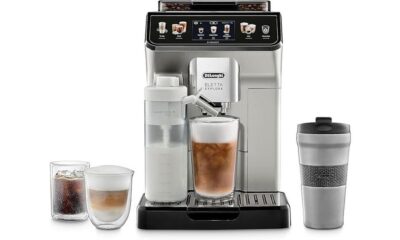
 Espresso Machines Reviews4 weeks ago
Espresso Machines Reviews4 weeks agoDeLonghi Eletta Explore: A Comprehensive Review [2025]
-
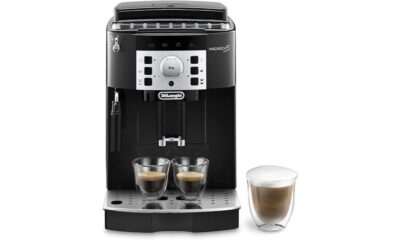
 Espresso Machines Reviews4 weeks ago
Espresso Machines Reviews4 weeks agoDeLonghi Magnifica S ECAM22.110.B Review: A Coffee Lover's Dream [2025]
-
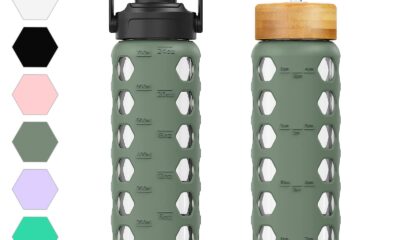
 Cappuccino Oracle Selected Reviews4 weeks ago
Cappuccino Oracle Selected Reviews4 weeks agoBest Glass Water Bottles for Eco-Friendly Hydration [2025]
-
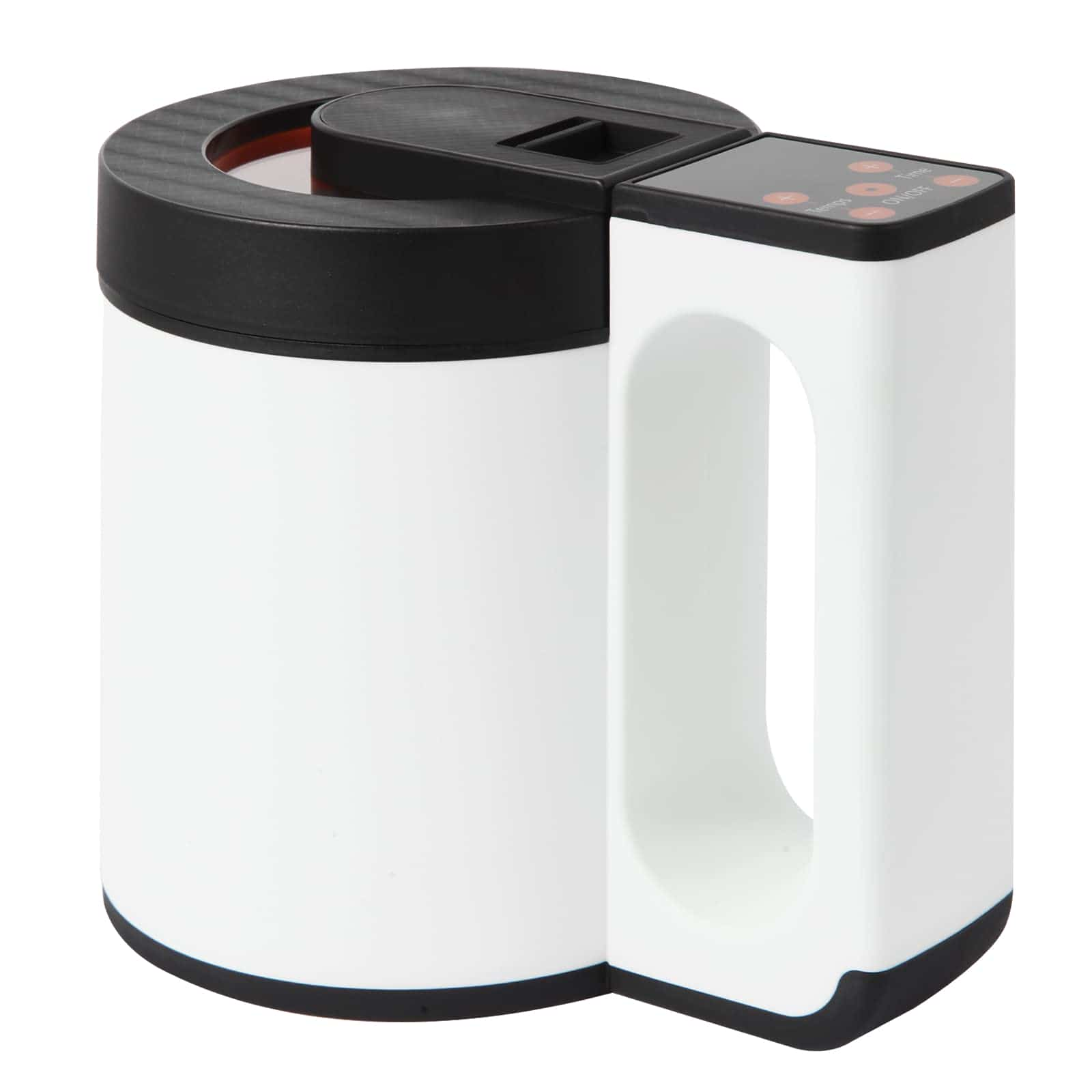
 Cappuccino Oracle Selected Reviews1 week ago
Cappuccino Oracle Selected Reviews1 week agoHighPlant HerbAblility Decarboxylator and Infusion Machine Review (2025)
-
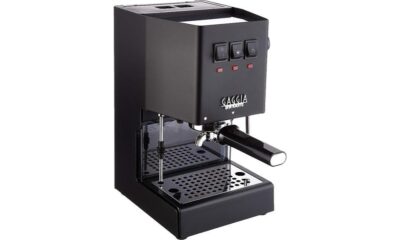
 Espresso Machines Reviews4 weeks ago
Espresso Machines Reviews4 weeks agoGaggia Classic Evo Pro Espresso Machine Review [2025]
-
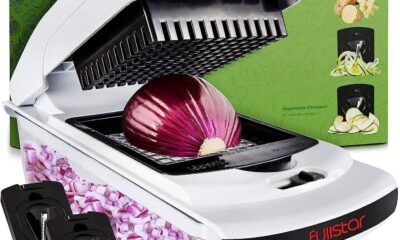
 Cappuccino Oracle Selected Reviews4 weeks ago
Cappuccino Oracle Selected Reviews4 weeks agoBest Onion Choppers for Efficient and Consistent Chopping [2025]
-

 Cappuccino Oracle Selected Reviews2 weeks ago
Cappuccino Oracle Selected Reviews2 weeks agoNinja JC151 NeverClog Cold Press Juicer Review
-
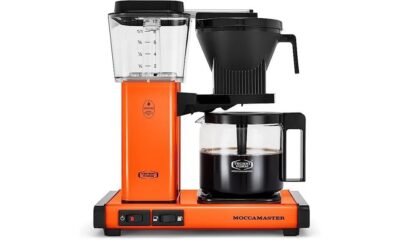
 Espresso Machines Reviews2 weeks ago
Espresso Machines Reviews2 weeks agoTechnivorm Moccamaster KBGV Review: The Perfect Coffee Maker





























